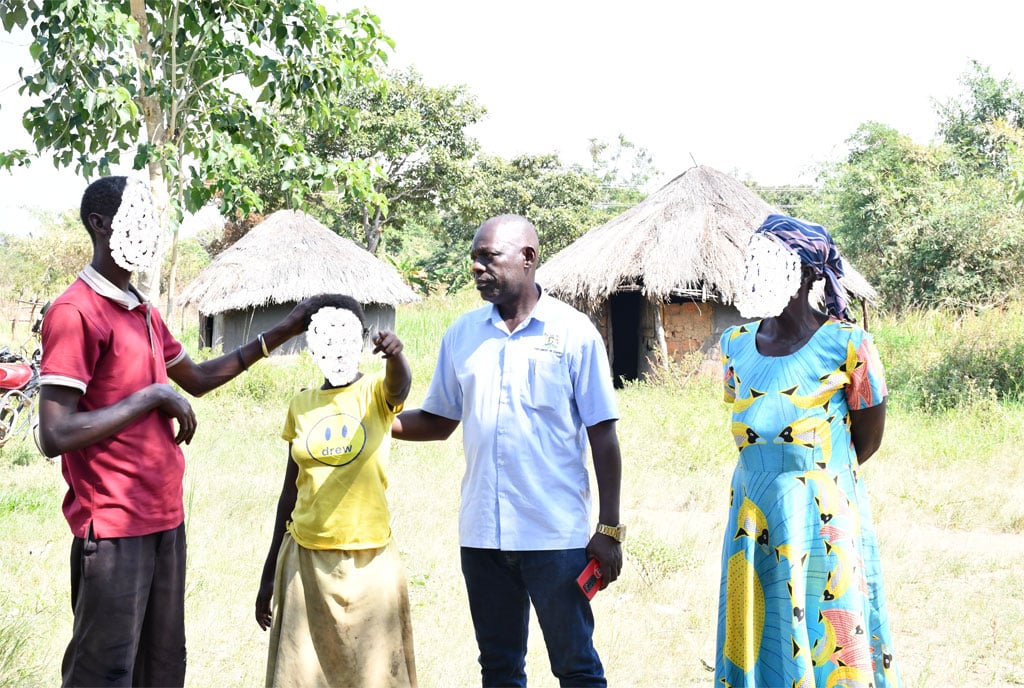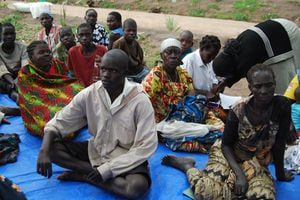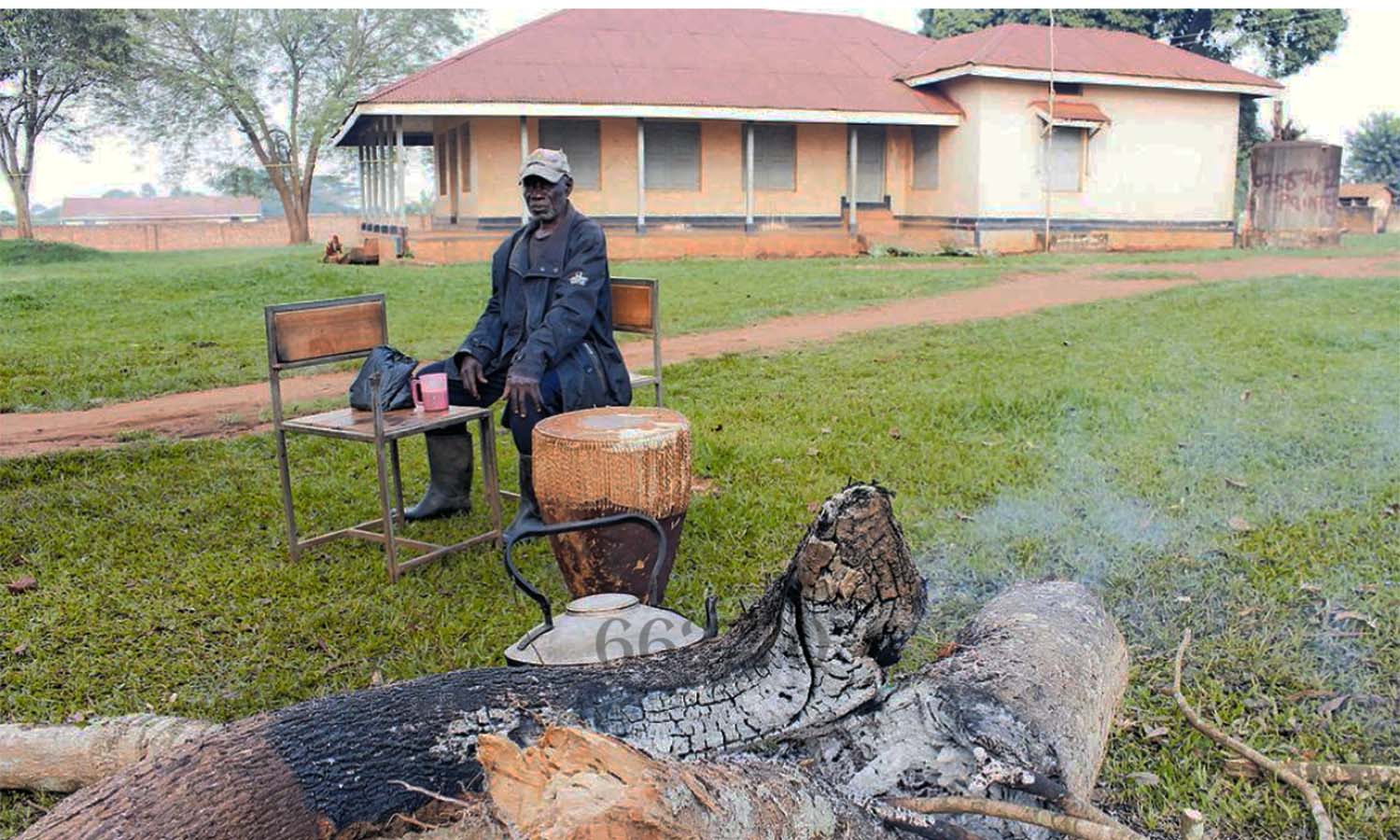
A man suffering from nodding disease syndrome in Odek Sub-county, Omoro District. PHOTO/EMMY DANIEL OJARA
Ms Sarah Atim, 22, from Akoyo Village in Odek Sub-county, Omoro District, bears the scars of a fire accident caused by nodding syndrome, a condition that has affected numerous children and adults in Acholi districts such as Pader, Kitgum, Omoro, and Gulu.
Despite the challenges, she wears a bright smile and a neatly styled “Janet Cut” hairstyle, holding her eight-month-old daughter in a locally made carrier as she welcomes visitors at the former nodding syndrome care centre in Akoyo.
Atim has battled nodding syndrome since she was aged eight and still relies on treatment. Her health struggles were compounded when she fell into a fire.
Raised by her bedridden mother after losing her father during the Uganda People’s Democratic Army insurgency, Atim’s education at Rackoko Primary School was cut short when she developed the condition in Primary Three.
She was a bright pupil and had been promoted to the Primary Four, something fate did not allow.
“I was admitted for care at Hope for Humans’ Nodding Syndrome Care Centre from 2012 until 2015. From there, I was surviving on medication and supplements until when my condition eventually improved and I was taken back home,’’ Ms Atim narrated her story during an interview on Saturday.
In 2016, after receiving care, Atim’s life took a turn for the better when someone she can only identify as Rash, a volunteer from the centre, sponsored her training at the Women Development Centre in Gulu.
She spent six months learning tailoring and sweater knitting.
“I spent six months in Gulu, where I was trained in tailoring, and sweater knitting, later I received a sewing machine and some materials for a start-up,’’ Ms Atim said.
“Since then, I have been able to provide for myself, my sick mother and my elderly sister who was supporting me all through my sick periods. I can knit sweaters, make dresses, and patch clothes. On a daily, I can make between Shs5,000 and 10,000,’’ she explained.
She added: “I was later married to a man from Opwa Village in Lira City, but unfortunately, the marriage didn’t work out due to recurrent domestic violence. I was then forced to return home where I now live with my mother.’’
With her skills, Atim has managed to support her mother, siblings, and her own two young children (aged three and 10 months).
Ms Atim comes from a family of 12 siblings, six are surviving, among them a brother, who has a hearing and speech impairment.
Despite the breakdown of her sewing machine and the challenges of raising children alone after leaving an abusive marriage, she remains resilient and hopeful.
Keeping her dreams alive
While growing up as a pupil of Rackoko Primary School, Ms Atim developed passion for nursing. She was inspired by the prospect of saving lives, but this dream could not be achieved due to nodding syndrome.
However, Ms Atim said she sees a bright future if given a chance to study again and pursue her dream since she no longer gets recurrent attacks.
“When I was growing up I had wanted to become a professional nurse, but I don’t know whether it was the devil’s work that made me suffer the nodding syndrome attack. I must say that I feel I can still make this dream a reality if supported,’’ she noted. Ms Atim’s elder sister, Ms Eveline Adong, highlighted Atim’s determination and hard work.
“There is little money here in the village, and the biggest challenge is that she lacks enough materials. I remember when she was young, she had much interest in education but unfortunately, she developed nodding syndrome condition.’’
According to Ms Adong, her sister is a testimony that nodding syndrome victims can thrive if given treatment and opportunities.
Mr Denis Ojok Okumu, a social worker in Odek Sub-county, praised Atim’s work as an inspiration to other families.
Ms Nighty Ajok, 52, a mother of six from Palaro Ongany Village in Odek Sub-county, Omoro District, has an 11-year-old son who suffers from nodding syndrome.
She said: “For me, I think the best assistance for my child is if someone or the government can provide him with skills training so that he becomes economically independent in the future. We have hope that he will be very useful if he fully recovers.”
The family, which relies solely on peasant farming, sometimes resorts to tying and locking him in the house when they need to attend to other livelihood activities.
Mr Charles Ocen Okodi, the community development officer of Odek Sub-county, said: “We have these families who need a lot of support in terms of income-generating activities, they need to be supported with capital so that they can run their small businesses’’.
He added: “We have the victims who are now adults and others are now better after taking drugs because sometimes, they can do certain things on their own. Some were trained in tailoring but they now need financial support so that they can grow their business’’.
Ms Provia Ayebare, the executive director of the Proven Foundation charity organisation, affirmed that hands-on skills are vital for empowering families and ensuring sustainable economic independence.
She added that they have supported some households and victims of nodding syndrome in weaving, bakery, soap making, tailoring, and making reusable sanitary pads.
Mr Justine Ojok, the nodding syndrome focal point person in Omoro District, said adherence to anti-convulsant treatment, nutrition, psychotherapy, and music therapy are key elements for recoveries among nodding syndrome patients.
Omoro District has 212 cases of nodding syndrome with no new cases registered.






